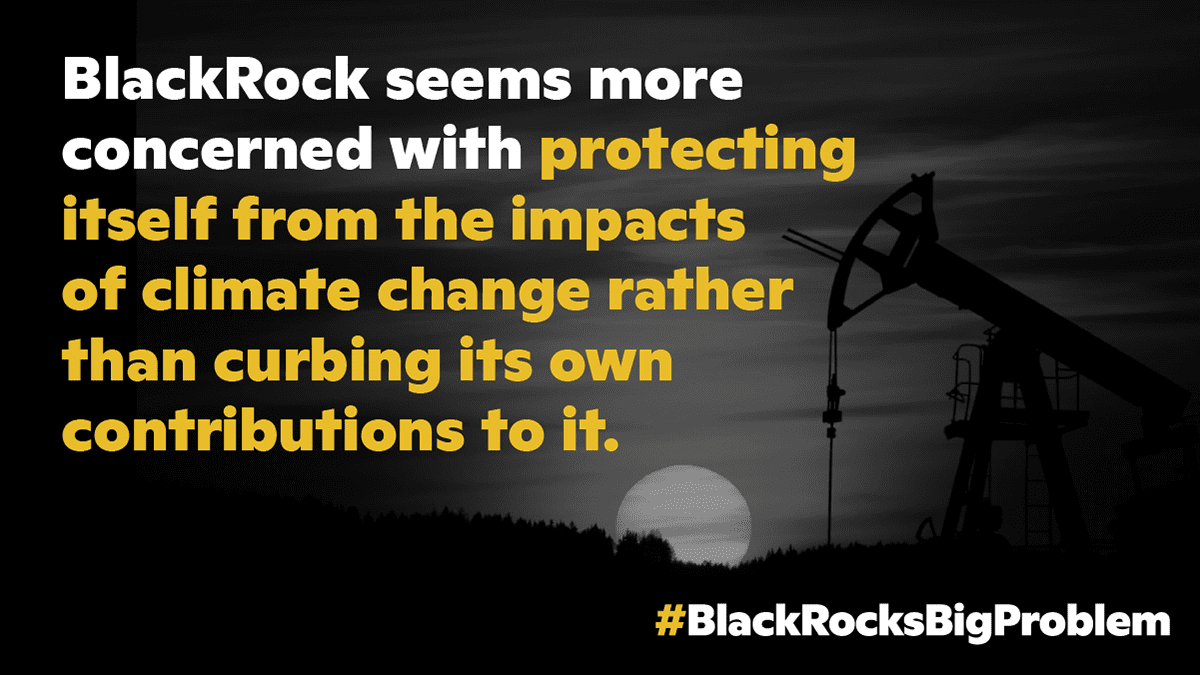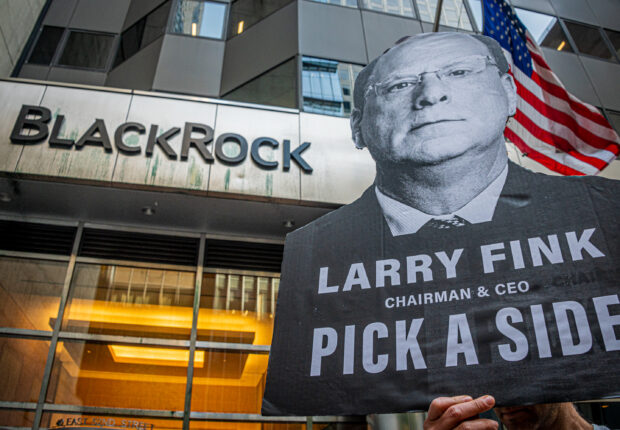Today, the BlackRock Investment Stewardship (BIS) team released a memo entitled Climate Risk and the Transition to a Low-Carbon Economy. It follows BlackRock CEO Larry Fink’s recent annual letter and further details BlackRock's climate priorities and strategies, as well as expectations for the companies it invests in. Because companies from across the economy will look to it as a blueprint for BlackRock’s future actions, this memo is significant, and its words and details matter.

BlackRock sends a number of mixed signals with today’s memo. On the one hand, it communicates an important and necessary message about the need for greenhouse gas (GHG) emissions reductions, writing that companies “should strive to limit warming to 1.5° C to achieve an ultimate goal of net zero GHG emissions by mid-century in order to mitigate the worst effects of climate change.”
On the other hand, BlackRock is less clear about what type of plans it expects from companies to achieve those reductions, saying vaguely that “companies should consider how they will manage the impacts that [climate] risks have on their business and demonstrate preparedness to operate in a low-carbon economy.”
This focus on risk management where BlackRock outlines its expectations from companies indicates that BlackRock is more concerned with protecting itself from the impacts of climate change rather than also curbing its own contributions to it. Risk management does not necessarily entail GHG emission reductions. Will BlackRock insist that companies set emission targets compatible with limiting climate change to 1.5º C, in addition to or instead of merely taking actions that protect shareholder value?
Below we have listed what we view as strengths and weaknesses, and our questions about this memo. While it provides some important new points, further information and action from BlackRock is needed to truly achieve visionary climate leadership. We also await further clarification from BlackRock on how it plans to align its own portfolio with net zero—which it committed to do last month—and, specifically, in a way that accounts for impacts on frontline communities and the rights of Indigenous and tribal peoples.
What we like (with caveats)
- BlackRock’s expectations for corporate boards and management teams include a baseline assessment of current GHG emissions and disclosure of a net zero plan with “rigorous” short, medium, and long-term targets, as well as goals to limit scope 1 and 2 GHG emissions, and scope 3 GHG emissions for “carbon-intensive industries” (which BlackRock does not define). This is a welcome development, though BlackRock stops short of demanding emissions reductions compatible with a 1.5º C of warming limit, which is necessary to have even just a 50% chance of avoiding the worst impacts of climate change, and those reductions need to begin immediately.
- While BlackRock appears to recognize that short term targets are crucial to any net zero plan, much more detail is needed from BlackRock about what kind of short term targets it expects from companies. For example, BlackRock says “we expect developed markets to be shifting away from reliance on coal as a fuel source,” and that it expects companies to disclose scope 1 and scope 2 GHG emissions and accompanying GHG reduction targets. But in both cases, it neither indicates how much reduction in reliance or emissions it expects, nor by what date.
- BlackRock acknowledges the differentiated challenges for companies in developing markets, particularly Asia, and calls on them to “begin to disclose GHG reduction targets” and consider this for “long-term capital expenditures and planning.”
- BlackRock expects all members of companies’ boards and management to be fluent in climate risk and energy transition “rather than a single director who is a ‘climate expert.’” BlackRock expects disclosure and progress on mitigating risk, capitalizing on efficiencies, innovation and opportunity. While a great start, this will not ensure that companies are urgently and fundamentally realigning their capital expenditures and policy influence to industry-specific GHG emissions reductions in line with 1.5º C.
- BlackRock may vote against directors if disclosures and action are insufficient or there is no credible plan with short, medium, and long-term GHG reduction targets.
BlackRock may support shareholder proposals that address gaps or help accelerate a company’s action to address climate risk. - BlackRock expects private and public sectors to transition to a low-carbon future and that “the transition to renewable energy is likely to result in a net economic gain for our global economy.” Additionally, BlackRock is clear that “the loss of fossil fuel intensive jobs does not necessarily equate to absolute economic loss.”
- BlackRock is clear on the importance of reducing GHG emissions for net zero goals and the need to eliminate carbon from the “burning and production” of fossil fuels.
BlackRock calls for a “near elimination” of natural gas flaring by 2025.
What we have questions about
- Why does BlackRock focus on flaring and coal but not demand immediate action to phase out other especially-destructive fossil fuels like tar sands, Amazon oil, and Arctic oil?
- When will BlackRock require all companies to disclose scope 3 GHG emissions, not just carbon-intensive sectors? This is particularly important for banks and other financial firms, which, in January, BlackRock indicated it will begin to engage with on climate issues.
- How does BlackRock define carbon-intensive sectors? Clarity and details are needed on which companies will be asked to disclose scope 3 GHG emissions now.
- BlackRock acknowledges the science calling for a maximum temperature increase of 1.5º C, so why doesn’t it drop the “well below 2º C” language and demand a maximum of 1.5º C?
- In order to meet 1.5º C goals, we need strong action from financial markets but also government action in the form of regulation and legislation. Using the examples of coal and natural gas flaring, will BlackRock support legislation and regulation to help drive outcomes like these at national and subnational levels?
What is problematic or missing
- BlackRock continues to encourage coal, oil, and natural gas sectors to “explore strategic alternatives,” “ensure the viability of their business operations,” and “avoid stranded assets.” Yet to meet 1.5º C goals, these sectors cannot be part of our energy future. Does BlackRock want to meet 1.5º C targets based on science or is it trying to give outs for pure-play fossil fuel production and infrastructure firms to attempt to remain in business when there is no way for them to do so in a net zero world?
- BlackRock says that it may consider a host of actions if a company’s transition to a low-carbon economy fails to meet its criteria, but given the urgency of the climate crisis and BlackRock’s proposed climate commitments, “may” doesn’t go nearly far enough.
- While it is encouraging that BlackRock expects companies to transition away from coal, BlackRock remains silent on tar sands, oil, natural gas, and deforestation, which also are major contributors to climate change. Any company engaging in development of new fossil fuel reserves, not exiting coal on the timeline of Global Coal Exit List, not exiting tar sands, and/or having a no-deforestation commitment cannot have acceptable net zero plans.
- BlackRock must disclose the sectors and companies it is prioritizing for compliance with its climate commitments.
- While BlackRock clearly cites the science and extreme impacts expected even if we limit warming to 1.5º C, it continues to fuel the narrative that untested technology and false solutions (e.g., carbon capture and storage) are acceptable.
- While BlackRock acknowledges that carbon offsets are “not a replacement for substantive and sustained long-term emissions reductions plans,” by supporting the use of offsets in the short- and medium-term, BlackRock is either ignorant of, or just ignoring, the fundamental problems with carbon offsets. Carbon offsets have failed to reduce emissions, they often create enormous negative impacts on frontline communities, Indigenous rights, and old growth forests. Managing and mitigating climate risk must include stopping deforestation and addressing the impacts on frontline and Indigenous communities, along with prioritizing emissions reductions and a just energy transition.
For an analysis of Larry Fink’s letters to CEOs, read: Larry’s Letter: our in-depth analysis.

